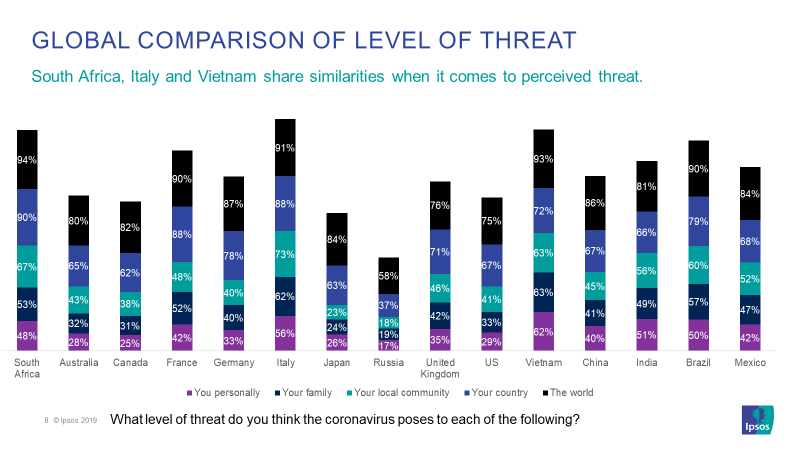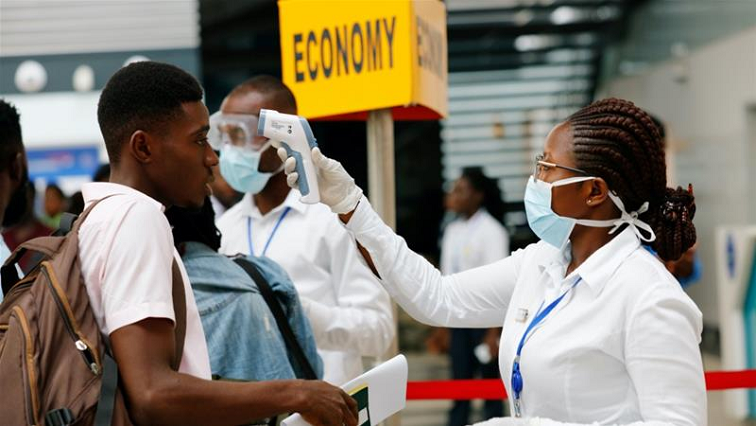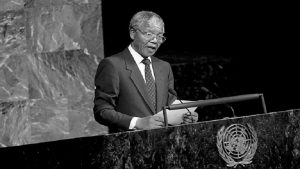A majority of online South Africans are confident that the national government is effectively addressing the threat posed by the spread of the coronavirus, even as lockdowns and closures force millions to isolate themselves. They also expressed their confidence in international institutions in handling the crisis.
The poll results show that about six in every ten online South Africans expressed confidence in the South African Government (61%) dealing with the spread of the pandemic. SA businesses are not (yet?) viewed with confidence regarding Covid-19 as only slightly more than half (52%) expressed confidence in the institutions that should play a key role in keeping our economy going.
However, with more and more businesses taking bold and active steps to support communities during these difficult times, this result might change rapidly in the weeks to come.
On the other end of the scale, the South African border control authorities are viewed rather negatively regarding their handling of the crisis, as half (50%) indicated that they are not confident in the actions taken by the SA border control authorities to curb the inflow or outflow of possibly infected people into (or out of) the country.

Tracking opinions about COVID-19 on a global scale
Ipsos has been conducting a global tracking survey since early February 2020, aiming to monitor and understand drivers of change in six broad areas:
- Purchase metrics and purchase intentions;
- Social issues and response to actions;
- Incidence of counter-measures;
- Behavioural and attitudinal measures;
- Responsibility and credibility; and
- Long-term outlook.
The global tracking survey has been conducted in the high-risk and heaviest-hit countries. However, in South Africa, the first wave has just been completed, but the survey will now be conducted regularly. Given the rapidly evolving nature of circumstances and the spread of the virus, questions in the survey get adapted regularly.

When analysing results and reporting on findings it was possible to do some comparisons between South African results and the results of similar questions asked in other parts of the world. The results show that – in the majority of the countries participating in this study – citizens expressed confidence in their respective governments’ efforts to contain the spread of the virus.
Across the world, Chinese (97%), Vietnamese (94%) and Indians (85%) expressed the most confidence in their governments. They are followed by citizens from Canada (74%), Italy (66%), South Africa (61%), Australia (60%), the UK and Brazil (both at 59%), France, the USA and Russia (all at 50%). Looking at the bottom of the list, less than half of citizens in Germany (49%), Japan (48%) and Mexico (45%) expressed confidence in the way their national governments are handling the crisis situation around the coronavirus.
Perception of threat
A question was asked about the magnitude of the threat posed by the coronavirus to the world, and the citizens’ country, local community, family and to them personally.

The results for South Africa show that online citizens believe that the biggest threat is to the world as a whole (94%), as well as to South Africa as a country (90%).
Similarly, most global citizens appear to be fairly concerned about the threat that the coronavirus poses on different levels (personal, family and community), but there is a much higher perceived threat at a national and global level. This view of coronavirus (and COVID-19) as a global threat is prevalent across the different countries surveyed.
Vietnamese (62%) and Italians (56%) perceive the virus to be a threat to them personally, while citizens in the USA (29%), Australia (28%), Japan (26%), Canada (25%) and Russia (17%) are least likely to agree that the virus poses a threat to them personally. (Again, this might be one of the measures changing rapidly in weeks to come, depending on the spread of the virus to new territories, more people testing positive for COVID-19, more deaths registered and the scarcity of equipment – like PPE, ventilators and ICU beds – becoming more and more evident.)






